I do not consider myself sociopolitically educated enough on Kashmir, to write on the current Kashmir situation. Yet I choose to write this as there’s no other way I can express how brutally torturous it is for me to read about a thirteen year old beaten to death, a five year old succumbing to pellet guns and another fourteen year old losing vision for life. I write, cause I fail to accept the ghastly and deplorable face of human wrath, greed or leadership paranoia. I write because I still hear a human heart pounding inside me, though I am not too sure if that’s a good feeling anymore.
I have been following the #Kashmirunrest updates online and on news channels for nearly two months now. In detail. Probably with more interest than ever before for I happened to be there a few months back. But that’s not important. What is important is how desperate I am right now to plead for peace and life in the valley.
How can a celebrated democracy explain this sordid state of killing of women and children? Who is to be blamed for the hundreds or maybe thousands losing their vision for life? Who decides whether pellet guns are less lethal? Whose interest is the government trying to protect – its own, or the one upheld by the kashmiris? And what exactly do some, who call themselves freedom fighters in the valley, aspire to achieve through stone-pelting at the army and police.
Whose orders are they waiting for, to give this outrage a break? Till they receive orders again. And, how strategic (pardon me if I am over – thinking) is it that the entire Kashmir valley lies paralyzed at a month in which lakhs visit the valley for Amarnath Darshan? And thereby, who is going to take the onus of the unthinkable loss of income suffered by the ponywalas, shikara walas, houseboat owners, tourist guides and umpteen kashmiris dependant on tourism at this time of the year?
Confident as I am that these questions have plagued the minds of many, I would want them answered. Cause I belong to no one. I belong to no side of the border. I do not justify the use of pellets to stop an unruly wrath-driven mob. As I said, I, as an inhabitant of this earth, demand an immediate step to stop the bloodshed.
My head hangs in shame when I learn how the army crushes the ribs of a frail old lady with their soles. I am choked as I read that the police stripped a 12 year old girl and laughed as she trembled with fear. And most importantly, I shudder to think of the vengeance brewing in her brother’s mind and how dangerous his nightmares will eventually make him.
Kashmir, in my eyes, is not just a beautiful piece of land. Kashmir is the people in it. The ones who look after the orchards, the ones who spend their lives farming, the ones who have somehow been, over the years, made to accept that curfews are a way of life, and a few killings here and there, bring them closer to freedom.
The colossal loss of revenue from tourism. The complete breakdown of e-commerce. The snapping of cellphone networks. The attack on the media and press. The total shutdown. Of what they have been fighting for… freedom.
No one cares. No one ever cared enough. For Kashmir.
Why is there no one to shout out and explain to them the myriad possibilities of dialogue? Why is there no one saying ‘Let us talk and find a less hideous course to some political healing’?
Why is no one venturing to look for the light at the end of the tunnel that Kashmir is in? Has been in?
The light is there. Let the light come in?
Devapriya Mukherjee is a writer from Kolkata.

